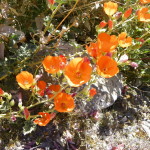 Spring: It is the long-awaited change of winter to spring. Seeds sprout, flowers bloom, and the sun warms the earth. There is a sense of renewal and new life all around.
Spring: It is the long-awaited change of winter to spring. Seeds sprout, flowers bloom, and the sun warms the earth. There is a sense of renewal and new life all around.
While winter was a time to conserve energy and reduce activity, spring is a time of regeneration, new beginnings, and a renewal of spirit.
The Principle of the Five Elements
The five elements refer to wood, fire, earth, metal, and water in Eastern philosophy. The Principle of the Five Elements (known as the Wu Hsing in Chinese) describes the flow of Qi and the balance of yin and yang.
According to the principle, all change – in the universe and in your body – occurs in five distinct stages. Each of these stages is associated with a particular time of year, a specific element in nature, and a pair of organs in the body. Change links together the seasons of the year, aspects of nature, and your body’s organs and bodily processes. A practitioner of traditional Chinese medicine uses this principle to diagnose and treat health problems, linking specific foods, herbs, and acupuncture points to the restoration of yin-yang and Qi.
Spring
Spring is the ideal time for cleansing and rejuvenation for overall health and well-being. As spring is represented by the wood element and includes the liver and its complementary organ, the gallbladder, these two organs are usually the primary targets for springtime cleansing and health regimens.
Element: Wood
Color: Green
Nature: Yang
Organs: Liver, Gallbladder
Emotion: Anger
Learn more about the Liver and Liver Qi Stagnation
Put Some Spring into Your Step
Spring corresponds to the “Wood” element, which in turn is conceptually related to the liver and gallbladder organs. According to the philosophy of Chinese medicine, the liver is responsible for the smooth flowing of Qi (energy) throughout the body. When the liver functions smoothly, physical and emotional activity throughout the body also runs smoothly. So, for optimum health this spring, move your Qi!
Stretch – The liver controls the tendons. According to Chinese medicine, the liver stores blood during periods of rest and then releases it to the tendons in times of activity, maintaining tendon health and flexibility. Incorporate a morning stretch into your routine. Try yoga or tai qi.
Eye Exercises – The liver opens into the eyes. Although all the organs have some connection to the health of the eyes, the liver is connected to proper eye function. Remember to take breaks when looking at a computer monitor for extended periods of time and do eye exercises.
Eat Green – Green is the color of the liver and of springtime. Eating young plants – fresh, leafy greens, sprouts, and immature cereal grasses – can improve the liver’s overall functions and aid in the movement of qi.
Taste Sour – Foods and drinks with sour tastes are thought to stimulate the liver’s qi. Put lemon slices in your drinking water, use vinegar and olive oil for your salad dressing. Garnish your sandwich with a slice of dill pickle.
Do more outdoor activities – Outside air helps liver qi flow. If you have been feeling irritable, find an outdoor activity to smooth out that liver qi stagnation. Try hiking or take up golf.
Enjoy milk thistle tea – Milk thistle helps protect liver cells from incoming toxins and encourages the liver to cleanse itself of damaging substances, such as alcohol, medications, pesticides, environmental toxins, and even heavy metals such as mercury.
Get Acupuncture treatments – Acupuncture and Oriental medicine can help improve the overall health of your liver as well as treat stress, anger and frustration, which are often associated with liver qi disharmony.
By: Diane Joswick, L.Ac., MSOM
Source: www.acufinder.com

